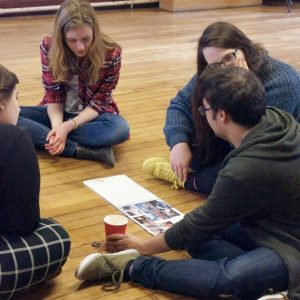The Athenians valued the performance of drama, as a mass art form and communal experience. They invested heavily in it too. This post is about how these facts about Greek theatre can inspire young performers to think about, and argue for, the real value of what they love doing.

Three members of cast experiment with masks in the opening chorus. Photograph: Ralph Anderson
The youth theatre group I’m working with are passionate about acting and performing. And although I need to work on conveying this in front of the project’s Handycam, I am equally passionate about researching and teaching Greek drama. But I have no prior experience of how to make this expertise meaningful within a context of community-based theatre education and practice. So the project is as much about what Stephen and the group can teach me as it is about what I can bring to them.
I learned my first important and surprising lesson in my initial meeting with the group back in September 2016. (This was before we had even fully decided on the project’s goals). The group’s manager and teacher, Stephen Jones, knows a good deal about Greek theatre, having studied it (among other things) at university. But the group itself only knew a few bits and pieces. So, I had come prepared to give them an overview of the context and conventions of Greek drama and I’d also got some answers to questions which they’d sent to me in advance: why did the Greeks not have female actors and chorus-members? How was gender depicted on stage? How were masks used? How did gods appear? Why was violence generally kept off stage in Greek tragedy?
These were all good questions and I did my best to answer them. But it was during the initial overview that things took a surprising turn. I was explaining that Greek drama was central to the Athenian religious festival calendar; that it was a mass art form watched and enjoyed by thousands of citizens; that the Athenians put huge amounts of resource and organizational effort into putting on these plays; that great prestige and honour attached to those wealthy citizens who funded a winning chorus; that the choruses were trained-up ‘amateur’ citizens and that many audience members had experience of being in the plays themselves; that theatre was clearly integral to the culture and values of the Athenian citizen-state (the polis). I paused for breath and fumbled with my laptop to find some suitable images. Stephen jumped in and asked the group what they thought about everything I’d said so far. How did it compare with their experience and understanding of what theatre is now?

Stephen Jones of Byre Youth Theatre in discussion with members of the cast. Photograph: Ralph Anderson
The group had many diverse and differing opinions but they were all vehemently agreed that theatre just isn’t valued by their own society in the way that it was for the ancient Athenians. They didn’t see modern theatre as a mass art form and they were largely sceptical about my counter-argument that popular drama is still valued as a cultural and communal experience (thanks to cinema, television and online streaming services). For all that films and TV series can say something important and complex about our society, politics and values, they said, the fragmentation of audiences and the sheer quantity and variability of content meant that they weren’t anything like the communal experience of an Athenian dramatic festival. And they argued that this communal experience had value in and of itself.
This wasn’t just a detached, purely intellectual or academic debate for the group. Their view that live theatre is not a popular art form and is not properly valued was a matter of deep regret and intense personal feeling for them. The sociology of Athenian drama had offered them a means of discussing how marginalized and undervalued they felt as young people with a real commitment to drama. It wasn’t that they were idealizing classical Athens and its tragedies and comedies, either. They knew about its use of slavery and its exclusions and restrictions on women and foreigners. Their point was that this society produced great theatre through a commitment and appreciation which was both deeply held and genuinely ‘community-wide’. The fact that the Athenians were prepared to spend so much time and money on communal religious festivals and theatrical art highlighted the comparatively diminished status of the performing arts and ‘community theatre’ in the UK today.
Before that meeting, I had a rather prosaic reason for giving the title of ‘Ancient drama in the community’ to my overarching project. If the mission was to bring my department’s research and expertise in Greek and Roman drama out of the academy and into the wider world, this title seemed like a simple and effective description of that goal. What I now realize is that the socio-political centrality and cultural embeddedness of Greek drama – aspects of which are key to my own and colleagues’ research – are themselves important and salient items of evidence to bring into public debates about the social role and value of live theatre. The city of Athens and the surrounding demes of Attica developed a form of ‘community theatre’ which genuinely brought the mass of citizens – the dēmos – together to participate in it. This didn’t just produce all those great plays by Aeschylus, Sophocles, Euripides and Aristophanes. It forged a strong sense of communality and community by focusing citizens’ minds on shared values, tastes, priorities and commitments.
